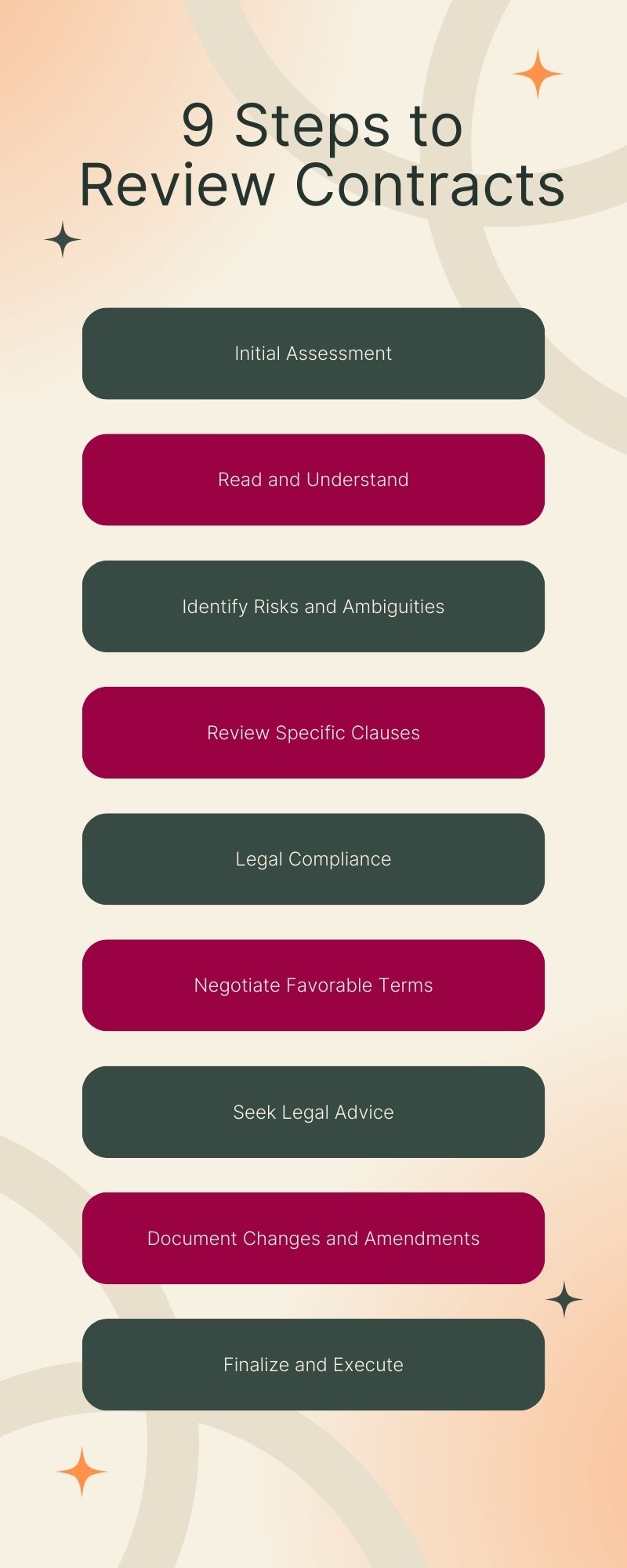Contract review plays a vital role in ensuring the legality, accuracy, and compliance of agreements. It involves a meticulous examination of contract clauses, terms, and provisions to identify potential risks, negotiate favorable terms, and protect the interests of all parties involved. With the advancement of technology, contract review software has emerged as a powerful tool to streamline and enhance the contract review process. This article serves as a comprehensive guide to contract review software, covering its importance, key stakeholders, best practices, common mistakes, and the role of Legitt AI in simplifying contract review.
What is Contract Review?
Contract review is the process of thoroughly analyzing and understanding a legal contract before signing to its terms. It involves a detailed examination of the contract’s language, clauses, provisions, obligations, and rights to ensure clarity, accuracy, and enforceability. Legal contract review aims to identify potential risks, ambiguities, inconsistencies, and areas where negotiations or revisions may be required. It is a crucial step in mitigating legal and financial risks, protecting parties’ interests, and ensuring essential elements of a contract with applicable laws and regulations.
You may also like: What is a CLM
Why Do You Need to Review Contracts?
The purpose of a contract review is to make sure that legal agreements and the clauses contained within them are strong, and that legal and financial risk is minimized to safeguard your company’s interests. Contract review is essential for several reasons:
- Risk Mitigation: By reviewing contracts, potential risks, such as unfavorable terms, ambiguities, or inadequate protection of rights, can be identified and addressed before they lead to disputes or legal issues.
- Contract Compliance Process: Contract review ensures that contracts align with relevant laws, regulations, and industry standards, minimizing the risk of non-compliance and breach of contract.
- Cost Control: By identifying and negotiating unfavorable terms, contract review helps control costs, prevent overpayments, and optimize financial outcomes.
- Clarity and Accuracy: Reviewing contracts enhances clarity and accuracy by eliminating ambiguities, inconsistencies, or errors that could lead to misunderstandings or disputes.
- Legal Protection: Contract review enables parties to protect their legal rights, ensuring that their interests are adequately represented and safeguarded.
You may also like: What can contract management software ensure
Who Should Review Contracts?
Contract review involves various stakeholders, depending on the nature and complexity of the agreement:
Legal Professionals: Lawyers or legal teams specializing in contract law have the expertise to review and assess the legal implications of contract clauses, ensuring their legality and compliance.
Business Professionals: Subject matter experts, such as procurement specialists, sales managers, or finance professionals, can review contracts from a business perspective to ensure they align with organizational objectives and strategies.
Contract Administrators: These professionals focus on reviewing contracts for administrative purposes, such as verifying data accuracy, tracking key dates, and ensuring compliance with internal policies.
Stakeholders: Parties directly involved in the implied contracts, such as clients, vendors, or contractors, should also participate in the review process to protect their interests and negotiate favorable terms.
You may also like: Contract administration vs contract management
How to Review Contracts?
Contract review follows a structured process to ensure a comprehensive analysis. Here are key steps involved:

Initial Assessment
Understand the contract’s purpose, scope, and parties involved. Identify critical areas that require special attention, such as payment terms, indemnification clauses, intellectual property rights, and termination provisions.
Read and Understand
Thoroughly read the contract, paying attention to each clause, provision, and obligation. Ensure clarity of language, consistency, and coherence.
Identify Risks and Ambiguities
Look for potential risks, ambiguities, or loopholes that may lead to unfavorable outcomes or disputes. Consider legal, financial, operational, and reputational risks.
Review Specific Clauses
Analyze key clauses, such as indemnification, limitation of liability, dispute resolution, confidentiality, and termination provisions. Assess their fairness, reasonableness, and alignment with your objectives.
Legal Compliance
Ensure that the contract complies with applicable laws, regulations, and industry standards
Negotiate Favorable Terms
If you identify unfavorable or ambiguous terms, consider negotiating with the other party to achieve a mutually beneficial agreement. Propose revisions or alternative language that better aligns with your interests.
Seek Legal Advice
Consult with legal professionals when necessary, especially for complex or high-stakes contracts. They can provide guidance, ensure legal compliance, and offer insights on potential risks and negotiation strategies.
Document Changes and Amendments
Maintain a clear record of any contract redlining, amendments, or revisions made during the review process. Clearly communicate and document agreed-upon modifications to ensure all parties are aware of the updated terms.
Finalize and Execute
Once the contract review is complete, ensure all parties are satisfied with the terms. Execute the contract automation according to the agreed-upon process, obtaining necessary signatures and authorizations.
Common Mistakes During Contract Review
Contract review is a meticulous process, and certain common mistakes can be avoided by following best practices:
- Failing to allocate sufficient time for a thorough contract review can lead to missed risks, errors, or unfavorable terms.
- Contract review should involve relevant stakeholders and legal professionals to benefit from their expertise and perspectives.
- Overlooking legal requirements and industry-specific regulations can result in non-compliance and legal consequences.
- Failing to address ambiguous or unclear language may lead to misunderstandings and disputes in the future.
- Inadequate communication between parties during the review process can result in missed opportunities for negotiation or clarification.
You may also like: How to write a contract proposal
Contract Review Checklist
A comprehensive contract review checklist can help guide the review process. While specific checklists may vary based on the contract type and industry, here are some general items to consider:
- Contract Purpose, Scope, and Parties
- Definitions and Interpretation
- Payment Terms and Pricing
- Delivery, Performance, and Acceptance Criteria
- Indemnification and Liability
- Intellectual Property Rights
- Confidentiality and Non-Disclosure
- Termination and Suspension
- Dispute Resolution and Governing Law
- Insurance and Risk Allocation
- Compliance with Laws and Regulations
- Change Control and Amendments
- Notices and Communication
- Force Majeure
- Assignment and Transfer
- Data Protection and Privacy
You may also like: Blockchain contract management
How Legitt AI Can Help in Contract Review
Legitt AI offers significant support in the contract review process by leveraging its advanced AI capabilities and legal expertise. Here’s how Legitt AI can assist:
- Automated Analysis: Legitt AI can quickly scan and analyze contracts, highlighting potential risks, ambiguities, and non-compliant clauses. This saves time and enhances accuracy.
- Legal Guidance: Legitt AI can provide contextual legal guidance, offering explanations of legal terms, provisions, and their implications.
- Standardization and Consistency: Legitt AI ensures consistent language and format across contracts, reducing the risk of inconsistencies or errors.
- Contract Templates: Legitt AI provides access to a library of pre-drafted free contract templates, saving time and effort in contract creation and review.
- Clause Recommendations: Legitt AI can suggest alternative language or propose revisions based on industry best practices, ensuring more favorable terms and reducing negotiation time.
- Collaboration and Workflow Management: Legitt AI facilitates collaboration between stakeholders, allowing for seamless communication, document sharing, and tracking of contract review progress.
Contract review is a critical process that requires careful attention to detail, legal compliance, and risk mitigation. Leveraging contract review software, such as Legitt AI, can greatly enhance the efficiency and effectiveness of the review process.
Did you find this Legitt article worthwhile? More engaging blogs about smart contracts on the blockchain, contract management software and electronic signatures can be found in the Legitt Blogs section. You may also contact Legitt to hire the best contract lifecycle management services and solutions along with free contract templates.
Frequently Asked Questions About Contract Review
Does a lawyer review a contract?
Yes, a lawyer typically reviews contracts to ensure their legality, compliance, and protection of their client's interests. They analyze the terms, assess potential risks, negotiate favorable terms, and provide legal advice regarding the contract's implications.
What is the purpose of contract review process?
The purpose of the contract review process is to critically examine and assess the terms, clauses, and provisions of a contract to identify potential risks, ensure accuracy, protect parties' interests, negotiate favorable terms, and ensure legal compliance.
What is a contract review form?
A contract review form is a structured document or template used to systematically assess and document the analysis of a contract. It typically includes sections or fields for recording key contract details, identifying risks, suggesting revisions, and documenting the overall review process and outcomes.
What are the stages of contract review?
The stages of contract review typically include initial assessment, reading and understanding the contract, identifying risks and ambiguities, reviewing specific clauses, negotiating terms, seeking legal advice if necessary, and finalizing the contract execution.
What is contract review checklist?
A contract review checklist is a tool used to ensure a comprehensive and systematic examination of a contract. It typically consists of a list of key elements and provisions that need to be reviewed, ensuring that no critical areas are overlooked during the contract review process.
What are key terms in a contract review?
Key terms in a contract review refer to the critical elements and provisions that require thorough analysis and assessment. These may include payment terms, indemnification clauses, termination provisions, dispute resolution mechanisms, intellectual property rights, and confidentiality obligations.
How long does it take for a lawyer to review a contract?
The time it takes for a lawyer to review a contract can vary depending on various factors, such as the complexity of the contract, the lawyer's workload, and the specific requirements of the review. It can range from a few hours to several days, or even longer for highly complex agreements.
What are the 4 stages of a contract?
The four stages of a contract are:
• Formation: Parties negotiate and agree on the terms and conditions of the contract.
• Performance: Parties fulfill their obligations as outlined in the contract.
• Breach: One or more parties fail to meet their contractual obligations.
• Remedies: Parties seek legal remedies for any breaches or disputes that arise from the contract.
